北师大版选修模块7Unit 19 Language Lesson 3课件(共46张PPT)
文档属性
| 名称 | 北师大版选修模块7Unit 19 Language Lesson 3课件(共46张PPT) |

|
|
| 格式 | zip | ||
| 文件大小 | 2.2MB | ||
| 资源类型 | 教案 | ||
| 版本资源 | 北师大版 | ||
| 科目 | 英语 | ||
| 更新时间 | 2016-04-16 00:00:00 | ||
图片预览

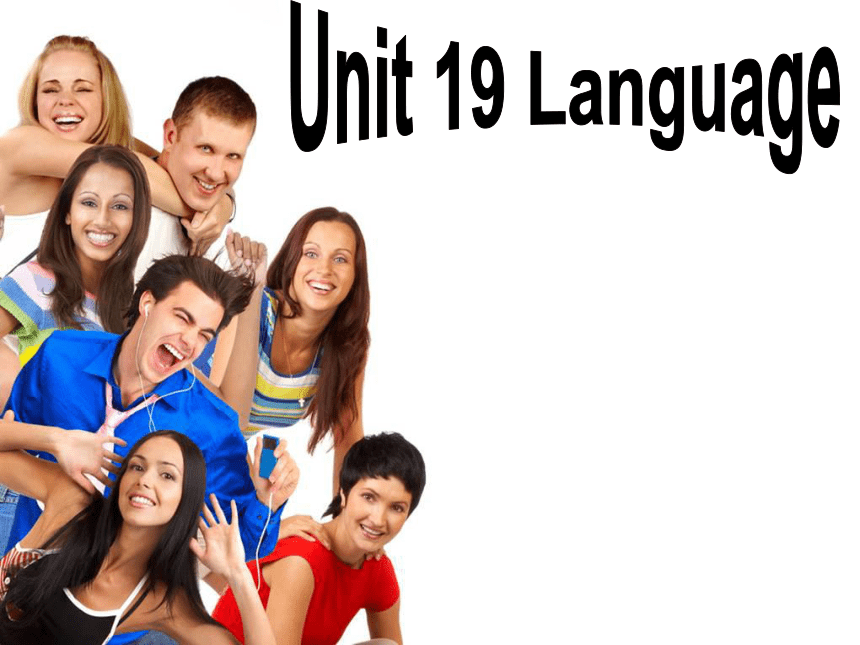
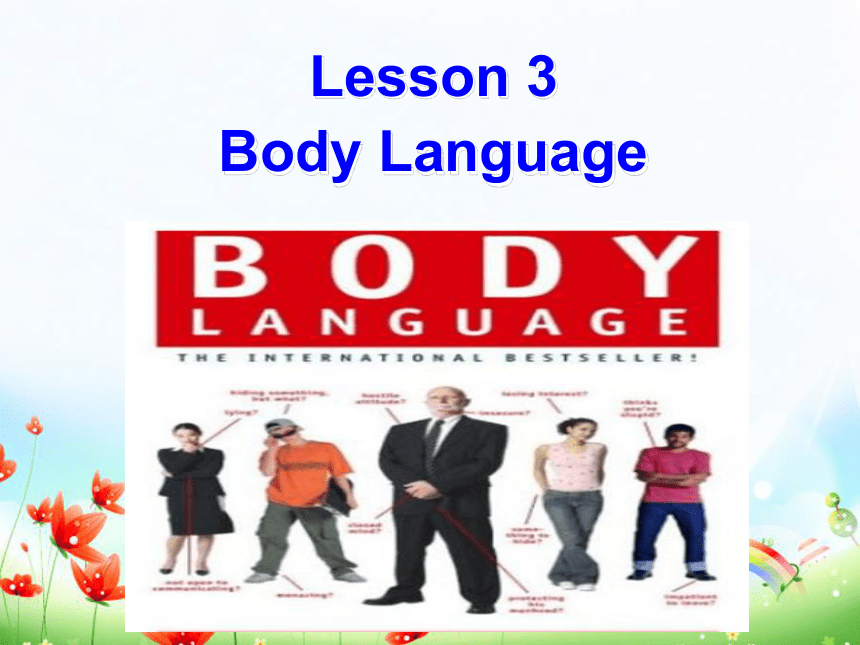
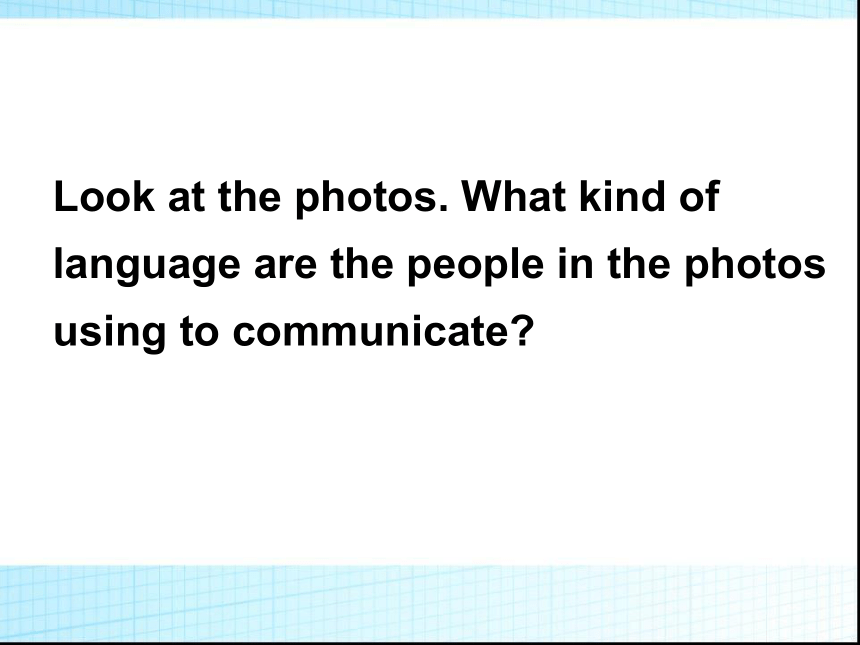
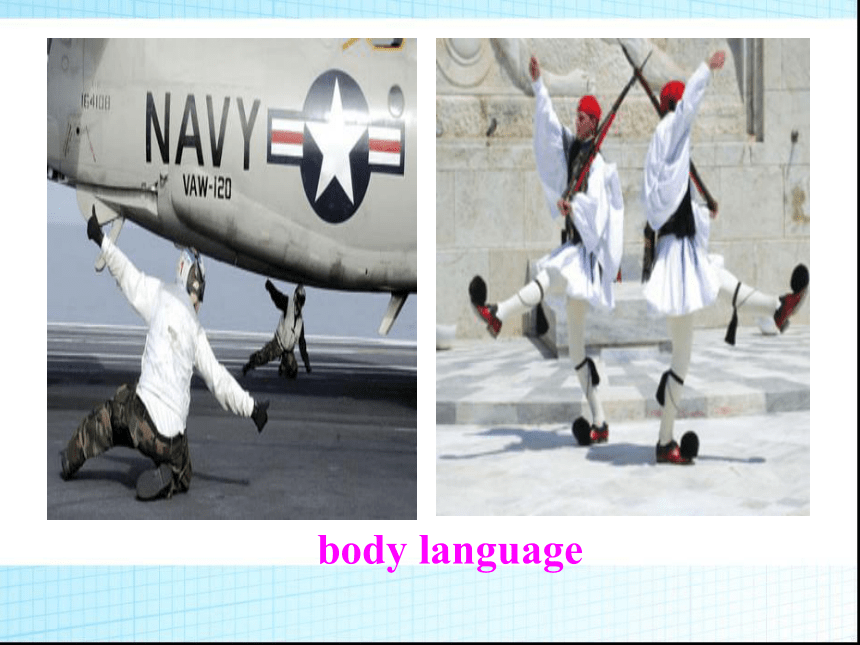
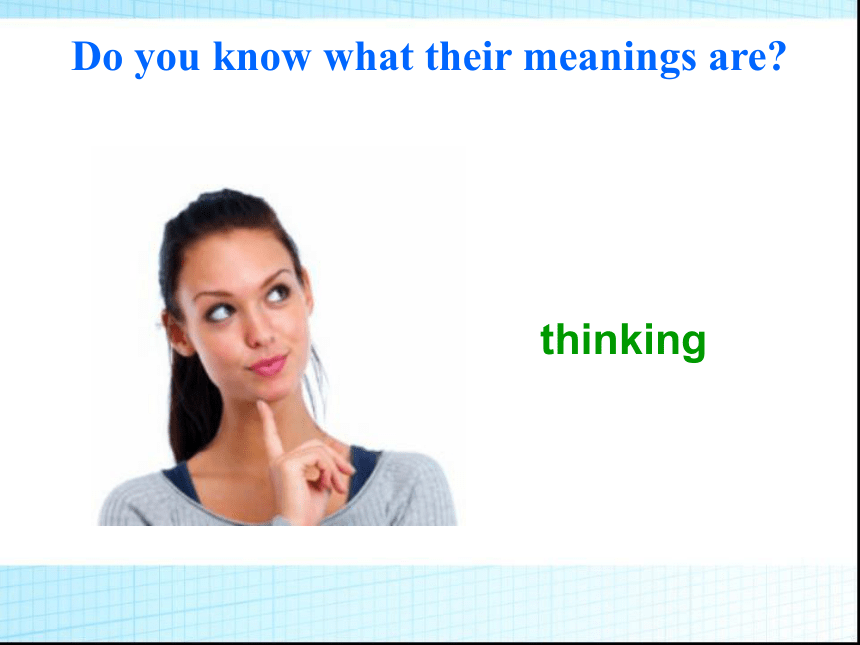
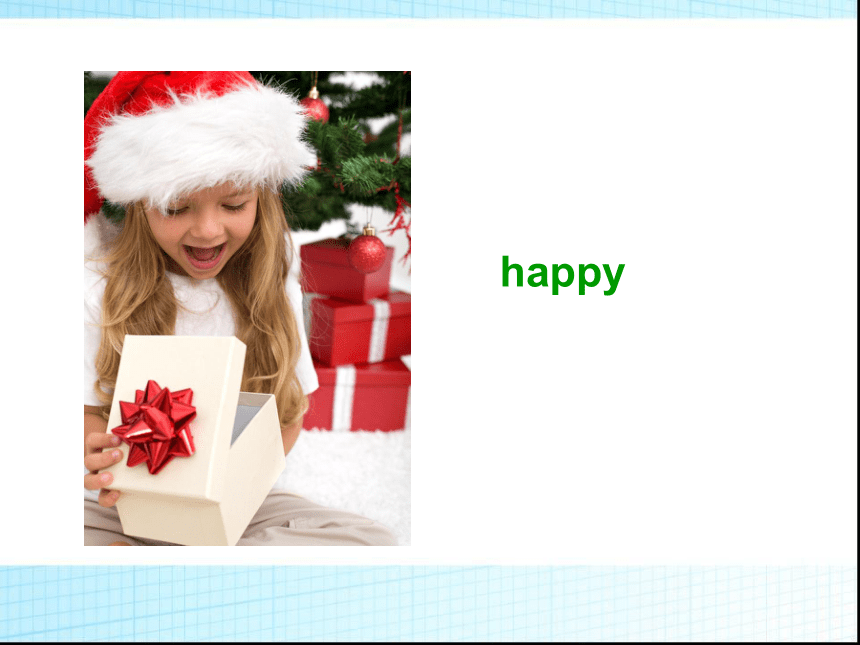
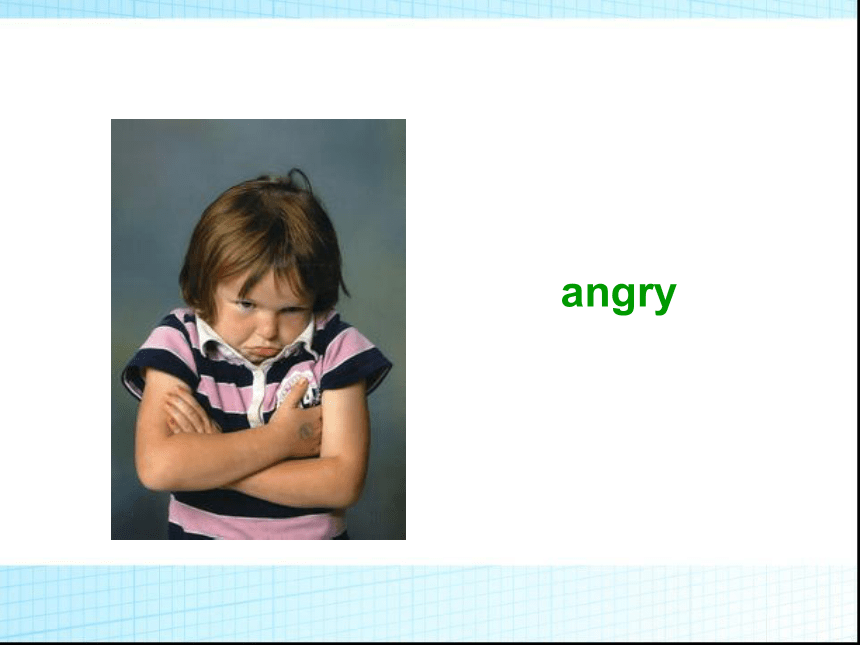
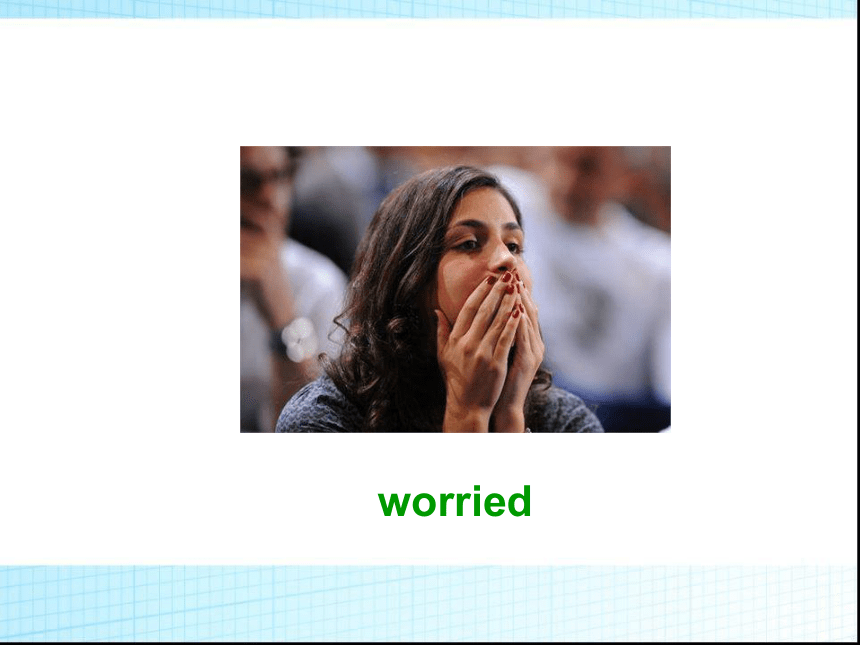
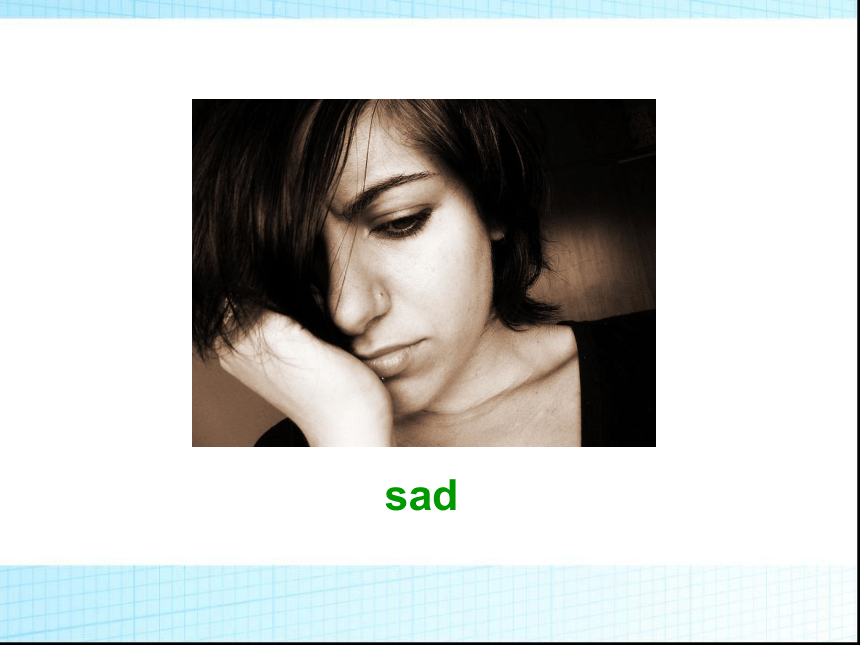
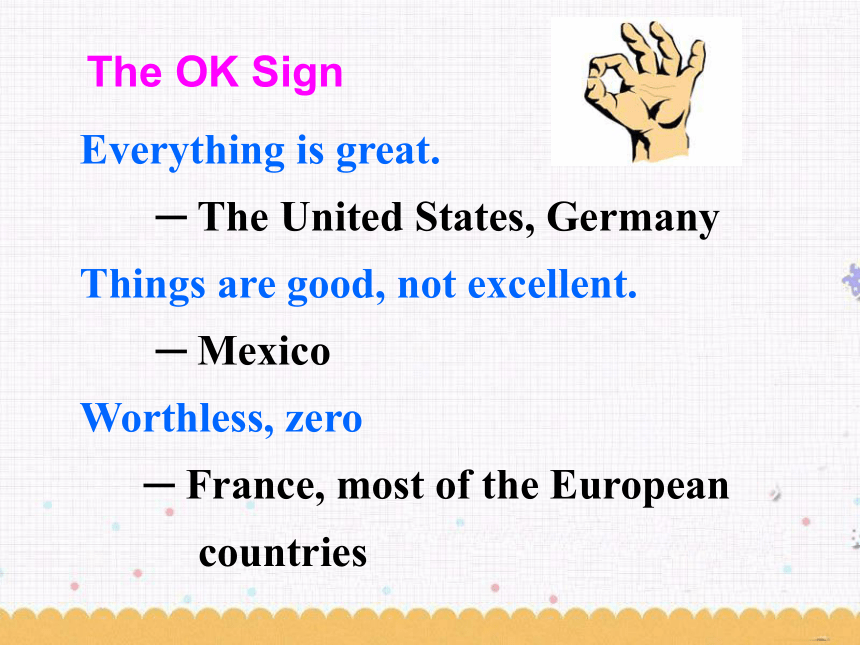

文档简介
课件46张PPT。北师大 高二
Unit 19Unit 19 Language Lesson 3
Body LanguageLook at the photos. What kind of
language are the people in the photos
using to communicate?body languageDo you know what their meanings are?thinkinghappyangryworriedsadThe OK Sign Everything is great.
─ The United States, Germany
Things are good, not excellent.
─ Mexico
Worthless, zero
─ France, most of the European
countries Symbols for money, especially for coins
─ Japan
Vulgar (粗俗的) gesture
─ Spain, Russia, Brazil
Threat of bodily harm
─ Tunisia The V Sign Victory
─ Great Britain, the United
States, most of the world
Peace
─ The United States (since 1960s)Thumbs Up Approval
─ Great Britain, The United
States, Russia, China
Highly offensive
─ Iran
Rude
─ Australia Disapproval
─ The United States
Rude
─ Greece Thumbs Down In pairs, talk about the various gestures, facial expressions and body movements that you often use to communicate your attitudes and feelings. Read the text and use the Strategies to choose a heading for each paragaph. There is one extra heading.Para.1 a) An aid to travellers
Para.2 b) Conscious and unconscious body language
para.3 c) The disadvantages of smiling
Para.4 d) Why body language can be confusing?
Para.5 e) What is body language?
Para.6 f) Concluding statement
Para.7 g) Introduction
h) Being aware According to the text, which of these statements are True and which are False.1. A person with crossed arms is
probably very calm.
2. Americans take offence at the “OK”
sign.FF3. Nodding your head means “yes” in
most cultures.
4. We congratulate people by jumping
for joy.TF1. You would probably think that the
father was congratulating his son on
doing something well.
congratulate on祝贺,向…道贺
e.g. We congratulated her on passing the
exam.Language points 2. It is a language without words that
consists of gestures, facial expressions
and body movements that greatly add
to- and sometimes even replace-spoken
language.
consist of
某物是“由……组成”的意思时, 强调结果是一个统一的整体, 但所有组成的成分之间往往保持着自己的特性, 用于主语动态。e.g. 这个大学由13个系构成。
The university consists of 13 departments.
这个医疗队由5名医生和3名护士组成。
The medical team consists of (is made up of) 5 doctors and 3 nurses. be made up of常可用来表示某物是用什么材料制造的意思, 用于被动语态。
e.g. 化合物是由元素组成的。
Compounds are made up of elements.
纸是由透明纤维构成的。
Paper is made up of transparent
fibers.3. Body language is used to communicate
both attitudes and feelings from
affection to anger just like any other,
but it differs from spoken language as
it is not always explicit.
同其他任何语言一样,身体语言被用
来交流喜怒等情感和态度,但是与口
头语言不同的是,它不总是明确清楚
的,所以它又不同于口语。differ from 与……相异,不同于
e.g. Written language differs from
spoken language.
书面语言不同于口语。
Our house differs from theirs in the
style of design.
我们的房子在设计风格上与他们的
不同。4. People often use body language on
purpose.
on purpose是固定短语,表示
deliberately, 故意地,有意地。
e.g. Five investigators believe the fire was
set on purpose.
大火调查人员确信这是故意纵火案。5. For example, in foreign countries, it is
very easy to purchase something
simply by smiling and pointing at what
you want.
purchase vt. 购买make a purchase 买件东西on special purchase 特价出售purchasing power 购买能力purchasing price 购买价6. Learning to be aware of your body
language can be very useful.be aware of: realize, 意识到······ e.g. John has been aware of having done something wrong.
We should be aware of the importance of environmental protection.7. Regardless of these differences, experts agree that across the globe there is one form of body language that receives universal approval — the smile.
尽管存在着这些不同,世界各地的专家们却一致认为有一种身体语言得到普遍的认同,那就是微笑。e.g. 我们所有的建议都遭到拒绝, 不管这
些建议的价值如何。
All our proposals were rejected,
regardless of their merits.
她不顾一切后果, 决心这样做。
She is determined to do it regardless
of all consequences.regardless of 不顾, 不惜 1. None of us likes Helen because she always says what she thinks ____ other people’s feelings.
A. regardless of B. in spite of C. in case of D. on account of Exercises2. When you want to accept a new job, you must pay more attention to the ___ for it.
A. conditions B. requirements C. demands D. requests 3. ____ is reported ____ Xinjiang has controlled the spread of the bird flu successfully.
A. It, that B. That, which C. Whether, what D. What, that Vocabulary Choose the word from the box to
complete the sentence in its proper
form.negotiate, resemble, explicit, ambiguous,
unconscious, transparent, affection,
rigid, dignity, merely1. You don’t ________ your father at all. You look more like your mother.resemble2. After I fell down the stairs I had no ____________ left.
3. You need to be _______ with little children otherwise they don’t understand.
4. I feel a lot of ________ for my grandmother.consciousnessexplicitaffection5. It was an __________ decision to buy a pink hat. I actually thought it was red!
6. Your shirt is so __________ I can see straight through it!
7. I ________ with the lady and got it $5 cheaper. transparentnegotiateundignified8. I shouted at him but he ______ raised his eyebrows.
9. This sign is __________. It can mean two things.
10. The chair was no longer _____. It was completely bent!merelyambiguousrigid Which of the following words and expressions are used for comparison, and which are used for contrast?unlike, similar, also, although, however, as well, while, differ from, both, on the other hand, but, same, just like, toosimilaralso, tooas welldiffer fromboth, samejust likeunlikealthoughhoweverwhile, buton the other hand like1. Many people in England use gestures that are (however/similar) to gestures in the USA.
2. Peter is a very friendly person. James is (too/ both).Now choose the conrrect words from the brackets.3. (While/As well) I like chocolate ice-cream, my mum likes coffee ice-cream. She likes strawberry (unlike/as well), (also/but) I don’t.SpeakingRead the text again and find out the answers to the questions with your partner.
1. How can tourists show what they like
or dislike in foreign countries?
2. How did the American tourists in
Germany make the hotel owner angry?
3. Why does smiling have a high success
rate all over the world?Answers:
1. They can point and smile to show what they
like. On the other hand, they can shake their
heads to show what they dislike.
2. He gave an “OK” sign by making a circle
with his gingers. Unlike in American where
this sign means that everything is fine, in
Germany, this gesture can cause offence.
3. The meaning of a smile is the same in every
culture and every country.
Unit 19Unit 19 Language Lesson 3
Body LanguageLook at the photos. What kind of
language are the people in the photos
using to communicate?body languageDo you know what their meanings are?thinkinghappyangryworriedsadThe OK Sign Everything is great.
─ The United States, Germany
Things are good, not excellent.
─ Mexico
Worthless, zero
─ France, most of the European
countries Symbols for money, especially for coins
─ Japan
Vulgar (粗俗的) gesture
─ Spain, Russia, Brazil
Threat of bodily harm
─ Tunisia The V Sign Victory
─ Great Britain, the United
States, most of the world
Peace
─ The United States (since 1960s)Thumbs Up Approval
─ Great Britain, The United
States, Russia, China
Highly offensive
─ Iran
Rude
─ Australia Disapproval
─ The United States
Rude
─ Greece Thumbs Down In pairs, talk about the various gestures, facial expressions and body movements that you often use to communicate your attitudes and feelings. Read the text and use the Strategies to choose a heading for each paragaph. There is one extra heading.Para.1 a) An aid to travellers
Para.2 b) Conscious and unconscious body language
para.3 c) The disadvantages of smiling
Para.4 d) Why body language can be confusing?
Para.5 e) What is body language?
Para.6 f) Concluding statement
Para.7 g) Introduction
h) Being aware According to the text, which of these statements are True and which are False.1. A person with crossed arms is
probably very calm.
2. Americans take offence at the “OK”
sign.FF3. Nodding your head means “yes” in
most cultures.
4. We congratulate people by jumping
for joy.TF1. You would probably think that the
father was congratulating his son on
doing something well.
congratulate on祝贺,向…道贺
e.g. We congratulated her on passing the
exam.Language points 2. It is a language without words that
consists of gestures, facial expressions
and body movements that greatly add
to- and sometimes even replace-spoken
language.
consist of
某物是“由……组成”的意思时, 强调结果是一个统一的整体, 但所有组成的成分之间往往保持着自己的特性, 用于主语动态。e.g. 这个大学由13个系构成。
The university consists of 13 departments.
这个医疗队由5名医生和3名护士组成。
The medical team consists of (is made up of) 5 doctors and 3 nurses. be made up of常可用来表示某物是用什么材料制造的意思, 用于被动语态。
e.g. 化合物是由元素组成的。
Compounds are made up of elements.
纸是由透明纤维构成的。
Paper is made up of transparent
fibers.3. Body language is used to communicate
both attitudes and feelings from
affection to anger just like any other,
but it differs from spoken language as
it is not always explicit.
同其他任何语言一样,身体语言被用
来交流喜怒等情感和态度,但是与口
头语言不同的是,它不总是明确清楚
的,所以它又不同于口语。differ from 与……相异,不同于
e.g. Written language differs from
spoken language.
书面语言不同于口语。
Our house differs from theirs in the
style of design.
我们的房子在设计风格上与他们的
不同。4. People often use body language on
purpose.
on purpose是固定短语,表示
deliberately, 故意地,有意地。
e.g. Five investigators believe the fire was
set on purpose.
大火调查人员确信这是故意纵火案。5. For example, in foreign countries, it is
very easy to purchase something
simply by smiling and pointing at what
you want.
purchase vt. 购买make a purchase 买件东西on special purchase 特价出售purchasing power 购买能力purchasing price 购买价6. Learning to be aware of your body
language can be very useful.be aware of: realize, 意识到······ e.g. John has been aware of having done something wrong.
We should be aware of the importance of environmental protection.7. Regardless of these differences, experts agree that across the globe there is one form of body language that receives universal approval — the smile.
尽管存在着这些不同,世界各地的专家们却一致认为有一种身体语言得到普遍的认同,那就是微笑。e.g. 我们所有的建议都遭到拒绝, 不管这
些建议的价值如何。
All our proposals were rejected,
regardless of their merits.
她不顾一切后果, 决心这样做。
She is determined to do it regardless
of all consequences.regardless of 不顾, 不惜 1. None of us likes Helen because she always says what she thinks ____ other people’s feelings.
A. regardless of B. in spite of C. in case of D. on account of Exercises2. When you want to accept a new job, you must pay more attention to the ___ for it.
A. conditions B. requirements C. demands D. requests 3. ____ is reported ____ Xinjiang has controlled the spread of the bird flu successfully.
A. It, that B. That, which C. Whether, what D. What, that Vocabulary Choose the word from the box to
complete the sentence in its proper
form.negotiate, resemble, explicit, ambiguous,
unconscious, transparent, affection,
rigid, dignity, merely1. You don’t ________ your father at all. You look more like your mother.resemble2. After I fell down the stairs I had no ____________ left.
3. You need to be _______ with little children otherwise they don’t understand.
4. I feel a lot of ________ for my grandmother.consciousnessexplicitaffection5. It was an __________ decision to buy a pink hat. I actually thought it was red!
6. Your shirt is so __________ I can see straight through it!
7. I ________ with the lady and got it $5 cheaper. transparentnegotiateundignified8. I shouted at him but he ______ raised his eyebrows.
9. This sign is __________. It can mean two things.
10. The chair was no longer _____. It was completely bent!merelyambiguousrigid Which of the following words and expressions are used for comparison, and which are used for contrast?unlike, similar, also, although, however, as well, while, differ from, both, on the other hand, but, same, just like, toosimilaralso, tooas welldiffer fromboth, samejust likeunlikealthoughhoweverwhile, buton the other hand like1. Many people in England use gestures that are (however/similar) to gestures in the USA.
2. Peter is a very friendly person. James is (too/ both).Now choose the conrrect words from the brackets.3. (While/As well) I like chocolate ice-cream, my mum likes coffee ice-cream. She likes strawberry (unlike/as well), (also/but) I don’t.SpeakingRead the text again and find out the answers to the questions with your partner.
1. How can tourists show what they like
or dislike in foreign countries?
2. How did the American tourists in
Germany make the hotel owner angry?
3. Why does smiling have a high success
rate all over the world?Answers:
1. They can point and smile to show what they
like. On the other hand, they can shake their
heads to show what they dislike.
2. He gave an “OK” sign by making a circle
with his gingers. Unlike in American where
this sign means that everything is fine, in
Germany, this gesture can cause offence.
3. The meaning of a smile is the same in every
culture and every country.
